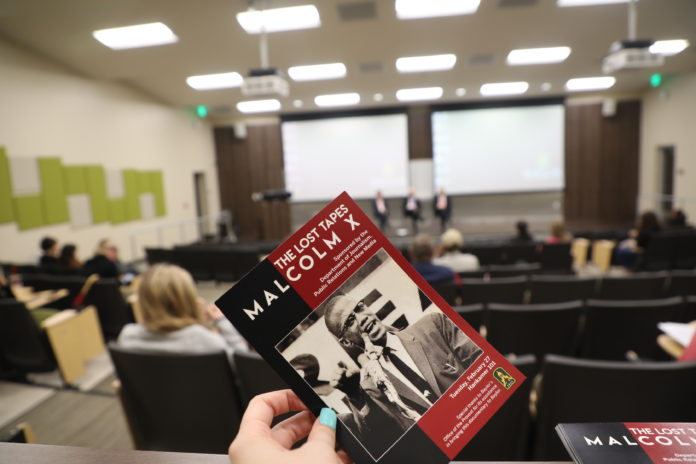
By Molly Atchison | Print Managing Editor
The prolific speeches of civil rights activist Malcolm X echoed off the walls of Hankamer 101 as the Baylor journalism, public relations and new media department provided a screening of Smithsonian Channel’s documentary “The Lost Tapes of Malcolm X.” A panel of esteemed researchers and communicators accompanied the screening and provided insight into the actions and legacy of such a passionate, driven individual.
The three panelists’ credentials alone set the stage for a knowledge-filled evening. Baylor graduate and senior vice president of production for Smithsonian Channel, Charles Poe, has been instrumental in producing some of the most widely-known documentaries the Smithsonian Channel has displayed to the public. Baylor associate professor of communication Dr. Scott Varda was also present, offering his wealth of insight into media communication and an analysis of X’s speaking style, as well as the topics on which he spoke. Finally, Baylor professor of history Dr. James Sorelle brought his breath of research on racial violence in Texas, the country and the civil rights movement as it relates to Texas history. Dr. Sara Stone, chair of the department of journalism, public relations and new media, mediated the panel.
The 50-minute documentary, which was centered around first-reference documents, interviews and recorded speeches, showed Malcolm X’s entrance into the public eye, his growth as an advocate, and to an extent, a radical voice in the civil rights movement and the legacy which he left behind. It analyzed the effects of Malcolm X’s work with the Nation of Islam, and how his identity as a converted Muslim affected his view of the civil rights movement. Although the panelists emphasized that there is no direct knowledge of what Malcolm X personally believed, his interaction with Elijah Muhammad and his leadership role in the Nation of Islam gives the public better insight into his world view.
After the documentary concluded, the event moved into the question and answer portion of the night. Poe began by talking about his goals throughout the creative process of the documentary.
“We just wanted to try and tell the story, and to kind of transport you back in time … [the intent of the documentary] is not to be the definitive history of Malcolm X, its to start a conversation about what he meant, not just to African American society, but to American life,” Poe said.
Varda and Sorelle continued to explain throughout the panel that Malcolm X was a “lightning rod” in the civil rights movement, pulling all the static and the people who did not quite agree with Dr. Martin Luther King Jr.’s nonviolent mentality, and giving them spoken representation in the conversation.
“One of the most useful aspects of the film is that it leads to a nuanced understanding of Malcolm X … and I think it acts as an access point for the newer generations, who may not otherwise be interested in him to learn more about one of the most enigmatic and important historical figures,” Varda said.
During the Q&A portion many questions centered around the transition of Malcolm X’s faith as his relationship with the Nation of Islam frayed. However, once again the panelists moved away from psychoanalyzing Malcolm X as a person, and instead referred to the documentary as a reference to X’s verbalized and internalized views on the civil rights conflict.
Sugarland junior Natalie Orth attended the screening and the panel, and said she felt that the panelists did an excellent job at moderating the conversation.
“I thought it was very insightful, and I thought it was interesting to learn more about [Malcolm X] and see some of the similarities and big differences between him and Martin Luther King,” Orth said. “I thought the panelists were very educated. I believe one of them [Sorelle] has spent 38 years or so studying these issues in the Waco area, and i think it’s great that they were able to bring in such specific, knowledgeable people.”
At the conclusion of the event, Stone presented Poe with a distinguished alumni award for his work with the Smithsonian Channel.
The Smithsonian Channel’s documentary will be presented throughout Texas and the country over the next few weeks, and the Smithsonian Channel is airing the next episode of the series on March 2 on live TV and on their website.





